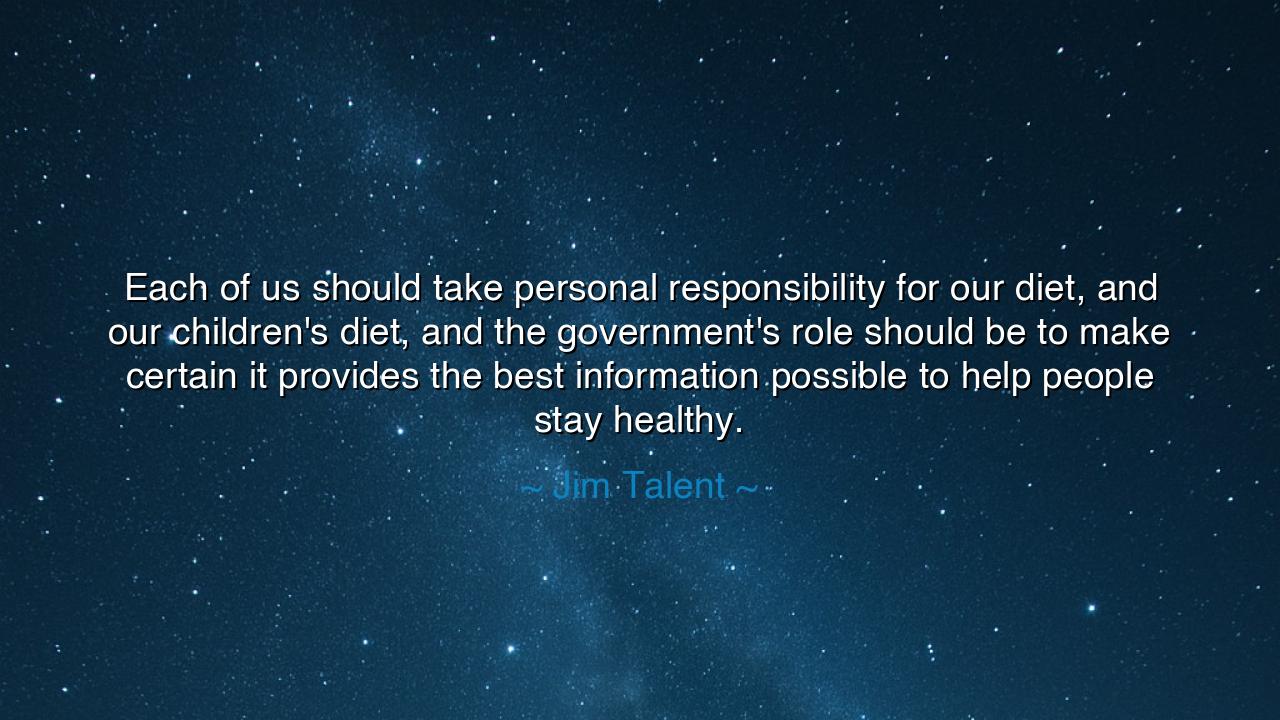
Each of us should take personal responsibility for our diet, and
Each of us should take personal responsibility for our diet, and our children's diet, and the government's role should be to make certain it provides the best information possible to help people stay healthy.






In the words of Jim Talent, “Each of us should take personal responsibility for our diet, and our children’s diet, and the government’s role should be to make certain it provides the best information possible to help people stay healthy,” there resounds a truth that is both civic and sacred — a call to awaken the power of responsibility within every individual. It is a teaching that transcends politics or policy, reaching into the eternal laws of life: that health, virtue, and well-being are not bestowed from above, but cultivated from within. These words, though spoken by a public servant, echo the wisdom of philosophers and sages who taught that self-governance is the highest form of freedom, and that to master one’s habits is to master one’s destiny.
To speak of personal responsibility for our diet is to speak of awareness, discipline, and reverence for the body — the vessel through which life itself expresses its power. In the ancient world, the great physician Hippocrates declared, “Let food be thy medicine and medicine be thy food.” He understood that health was not a gift of fortune, but the result of wisdom — of conscious choices made each day in what one eats, drinks, and teaches to one’s children. So too does Talent remind us that we are the guardians of our own well-being, and that neglecting this duty is a betrayal not only of self but of those who depend upon us. The wise understand that to nourish oneself rightly is to live in harmony with nature and with conscience.
His words also speak of the sacred responsibility to our children — for they are the continuation of our lineage and the reflection of our values. In every generation, parents are not only providers of food but teachers of balance. The ancients knew this well. In the Spartan agoge, children were raised not in indulgence, but in discipline, learning from an early age that strength is born of restraint and purpose. In contrast, a parent who feeds without wisdom, who allows the cravings of the moment to shape the habits of a lifetime, teaches weakness instead of strength. Talent’s wisdom reminds us that every meal shared, every choice made, becomes a lesson — a seed sown into the garden of a child’s soul.
Yet, in his words, there is also an acknowledgment of the government’s role — not as ruler over the body, but as bearer of truth. The ancients understood that a good leader does not dictate the lives of the people, but illuminates the path of knowledge so that they may choose wisely. Just as the philosopher-kings of Plato’s Republic were tasked with guiding citizens toward virtue, not controlling their every act, so too should governments, in Talent’s vision, provide the light of information rather than the chain of compulsion. The true power of a society lies not in laws, but in the wisdom of its citizens — in their ability to govern themselves with clarity and integrity.
Consider the tale of Marcus Aurelius, emperor and Stoic philosopher. He ruled an empire vast and mighty, yet he understood that the true empire a man must govern is himself. “Waste no more time arguing about what a good man should be,” he wrote. “Be one.” This is the spirit of Talent’s words: that no policy, no institution, no law can replace the moral strength of individual responsibility. A people who look only to authority for health or happiness are like soldiers waiting for others to wield their swords. Freedom without responsibility decays into dependency; responsibility without guidance, however, flourishes into strength.
When Talent speaks of the government’s duty to provide the best information possible, he invokes a covenant of wisdom and empowerment. For information is the seed of choice, and choice is the root of all progress. But knowledge without will is as useless as light to one who keeps his eyes closed. Thus, the balance between government and individual mirrors the balance between teacher and student, between master and disciple. The teacher may guide, but the student must act. The government may inform, but the people must live by that truth — with care, with discipline, and with gratitude for the body that sustains them.
Let this, then, be the lesson carried forward: no one can live your health for you. Not the physician, not the ruler, not the laws of the land. The path to strength begins at the table, and the future of nations begins in the home. Teach your children to respect their bodies as temples, to eat not only for pleasure but for purpose, to see food not as indulgence but as nourishment for the spirit. Seek truth from those who study it, but remember that wisdom without practice is like seed sown on stone.
Thus, the wisdom of Jim Talent becomes a commandment for all ages: govern yourself well, and you will need few to govern you. Take responsibility for your diet, for your children’s diet, and for the choices that shape the generations to come. Let the government offer guidance, but let your own conscience be your law. For in the union of knowledge and responsibility lies the strength of both the body and the nation — and in that strength, the promise of a healthier, wiser, and freer world.






AAdministratorAdministrator
Welcome, honored guests. Please leave a comment, we will respond soon